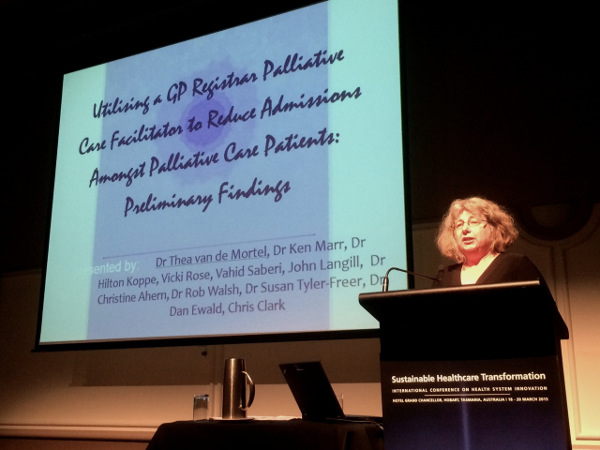Trialling the use of GP registrars to help manage patients accessing community palliative care services has shown promising results, writes Dr Thea van de Mortel, a member of the collaborative team comprising Northern NSW Local Health District, the North Coast Medicare Local, North Coast GP Training and Griffith University.
Recent estimates at both a state and national level suggest that demand for palliative care services will continue to rise by about 5% per year, given both the ageing population and the increase in rates of chronic disease. Effective community palliative care services reduce the need for hospital admissions and support patients in their choice to be cared for at home.
However, the majority of Australians, while preferring to die at home, actually die in hospital. Palliative care patients are often admitted to hospital for symptom management and once admitted have a length of stay that is four times the mean duration of stay for patients generally.
The National Health and Hospitals Reform Commission recommends ‘integrating multi-disciplinary primary health care services and improving access to services in the community, and better coordination and continuity of care for people with more complex health problems [and] strengthening consumer engagement and empowerment.’
Some of the suggested options for increasing consumer empowerment and improved coordination of care are to encourage patients to complete Advance Care Directives so their families and medical team are aware of their wishes in relation to care, and to improve continuity of care through better communication between GPs and specialist palliative care teams.
An innovative collaboration between the Northern NSW Local Health District, the North Coast Medicare Local, North Coast GP Training and Griffith University, which began in 2013 is making a difference to patients utilising community palliative care services in the Richmond network, in the Northern Rivers area of NSW.
The team has been trialling and evaluating utilising GP registrars based with North Coast GP Training to streamline the management of patients accessing community palliative care services. Delivery of the trial service has been funded by the Northern NSW Local Health District and the North Coast Medicare Local under the direction of Dr Ken Marr (Acting Director of Palliative Care Services), Ms Vicki Rose (Executive Director Allied Health Chronic & Primary Care ), and Mr Vahid Saberi, CEO of the North Coast Medicare Local. North Coast GP Training CEO, John Langill and Director of Training, Dr Christine Ahern have provided support to the registrars involved in the project.
Dr Rob Walsh, a previous North Coast GP Training (NCGPT) registrar, and Dr Susan Tyler-Freer, a current registrar, provide a service to community palliative care patients that involves an initial evaluation of patients in their homes at the time they are enrolled in the service, with ongoing as- needed evaluations and care planning in consultation with the patients’ GP and Dr Marr.
The registrars liaise between the patient and their family, the patient’s GP, and specialist palliative care services, and initiate the completion of an Advance Care Directive.
The registrars also provide an after-hours service to improve service provision outside of normal business hours. The registrars use tools such as the Resource Utilisation Group – Activities of Daily Living (RUG-ADL) instrument and the Australian Modified Karnofsky Performance Scale (AKPS) to guide functional assessment and the planning of care.
Once the patient has been assessed the registrar completes an advanced disease care plan in consultation with the patient’s GP and the palliative care team. The registrars conduct routine monitoring visits on a three-monthly basis, and as-needed assessments where required. When the patient’s functional status declines to a pre-determined level, an end of life care plan assessment takes place, and a Community End of Life Care Pathway is initiated.
The registrars also organise bereavement follow-up and death certification. Referral of patients into the service has been via the patient’s GP or specialists.
Evaluation of the program is being conducted by NCGPT and myself [Dr van de Mortel is with the School of Nursing and Midwifery, Griffith University] with funding from a Royal Australian College of General Practitioners’ Independent Practitioner Network grant obtained in 2014 [by Drs Hilton Koppe, Thea van de Mortel, Ken Marr, Rob Walsh and Dan Ewald].
Statistics on the number of admissions and number of inpatient days per 100 patient days, proportion of patients who are able to die at home, and proportion of patients who have completed an Advance Care Directive have been collected for patients in the intervention area and compared to those from patients in the other two community nursing areas in the Richmond Network.
To date there have been substantial improvements in outcome measures, which were reported via a presentation by Dr Thea van de Mortel on behalf of the team at the University of Tasmania’s ‘Sustainable Healthcare Transformation’ conference in Hobart in March 2015.
For example, patients receiving the registrar service are nearly twice as likely to die at home compared to patients receiving the standard service, and are approximately four times more likely to have completed an advance care directive.
Patients receiving the registrar service have 30% of the hospital admissions required by those in the standard service [around 1.5 per 100 vs 4.5 per 100] and take up less than half of the inpatient bed days. These very encouraging findings demonstrate that collaboration and innovation can pay dividends for health services, primary health care providers and, importantly, their patients. The project partners are working to extend the project.





